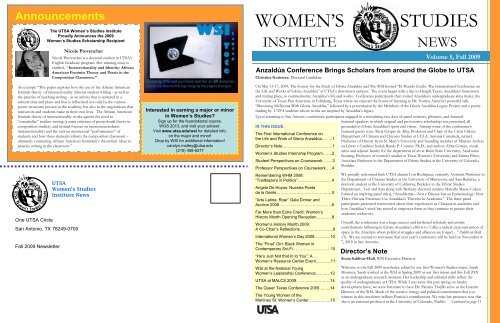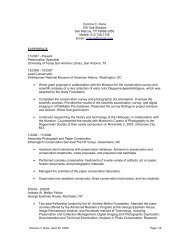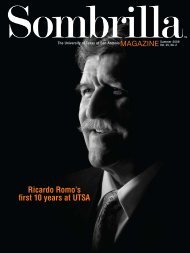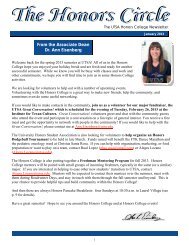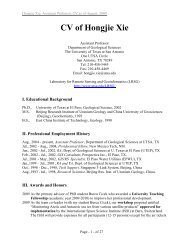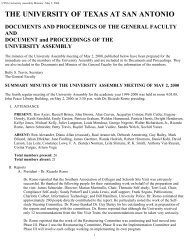Announcements - The University of Texas at San Antonio
Announcements - The University of Texas at San Antonio
Announcements - The University of Texas at San Antonio
Create successful ePaper yourself
Turn your PDF publications into a flip-book with our unique Google optimized e-Paper software.
<strong>Announcements</strong><br />
UTSA<br />
Women’s Studies<br />
Institute News<br />
One UTSA Circle<br />
<strong>San</strong> <strong>Antonio</strong>, TX 78249-0700<br />
Fall 2009 Newsletter<br />
<strong>The</strong> UTSA Women’s Studies Institute<br />
Proudly Announces the 2009<br />
Women’s Studies Scholarship Recipient<br />
Nicole Provencher<br />
Nicole Provencher is a doctoral student in UTSA’s<br />
English Gradu<strong>at</strong>e program. Her winning essay is<br />
entitled, “Intersectionality and Identity: African<br />
American Feminist <strong>The</strong>ory and Praxis in the<br />
Composition Classroom.”<br />
An excerpt: “This paper explores how the use <strong>of</strong> the African American<br />
feminist theory <strong>of</strong> intersectionality informs student writing - as well as<br />
the practice <strong>of</strong> teaching writing - as an activity th<strong>at</strong> is centered in a<br />
cultural time and place and th<strong>at</strong> is influenced not only by the various<br />
power structures present in the academy, but also in the negoti<strong>at</strong>ions th<strong>at</strong><br />
instructors and students make in their own lives. <strong>The</strong> African American<br />
feminist theory <strong>of</strong> intersectionality works against the need to<br />
“essentialize” student writing (a main criticism <strong>of</strong> postcolonial theory in<br />
composition studies), and instead focuses on interconnectedness<br />
(intersectionality) and the various met<strong>at</strong>extual “performances” <strong>of</strong><br />
students and how these elements inform the composition classroom –<br />
ultim<strong>at</strong>ely connecting African American feminisim’s theoretical ideas to<br />
practice writing in the classroom.”<br />
Interested in earning a major or minor<br />
in Women’s Studies?<br />
Sign up for the found<strong>at</strong>ional course,<br />
WGS 2013, and visit your advisor.<br />
Visit www.utsa.edu/wsi for detailed info.<br />
on the major and minor!<br />
Drop by WSI for additional inform<strong>at</strong>ion!<br />
carolyn.motley@utsa.edu<br />
(210) 458-6277<br />
WOMEN’S STUDIES<br />
INSTITUTE NEWS<br />
Volume 5, Fall 2009<br />
Anzaldúa Conference Brings Scholars from around the Globe to UTSA<br />
Christina Gutierrez, Doctoral Candid<strong>at</strong>e<br />
On May 15-17, 2009, <strong>The</strong> Society for the Study <strong>of</strong> Gloria Anzaldúa and <strong>The</strong> WSI hosted “El Mundo Zurdo: <strong>The</strong> Intern<strong>at</strong>ional Conference on<br />
the Life and Works <strong>of</strong> Gloria Anzaldúa” <strong>at</strong> UTSA’s downtown campus. <strong>The</strong> event began with a trip to Hargill, <strong>Texas</strong>, Anzaldúa’s hometown<br />
and resting place, to commemor<strong>at</strong>e Anzaldua’s life and works. Conference participants then visited Anzaldúa’s undergradu<strong>at</strong>e alma m<strong>at</strong>er, the<br />
<strong>University</strong> <strong>of</strong> <strong>Texas</strong>-Pan American, in Edinburg, <strong>Texas</strong> where we enjoyed the honor <strong>of</strong> listening to Dr. Norma Alarcón’s powerful talk,<br />
“Becoming MeXicana With Gloria Anzaldúa,” followed by a present<strong>at</strong>ion by the Members <strong>of</strong> the Gloria Anzaldúa Legacy Project and a poetry<br />
reading by UTPA students whose works are inspired by Anzaldúa’s legacy.<br />
Upon returning to <strong>San</strong> <strong>Antonio</strong>, conference participants engaged in a stimul<strong>at</strong>ing two days <strong>of</strong> panel sessions, plenaries, and fe<strong>at</strong>ured<br />
fe<strong>at</strong>ured speakers in which original and provoc<strong>at</strong>ive scholarship was presented, all<br />
IN THIS ISSUE:<br />
grounded in Gloria Anzaldúa’s spirit and vision. Among some <strong>of</strong> the conference’s<br />
fe<strong>at</strong>ured guests were Alicia Gaspar de Alba, Pr<strong>of</strong>essor and Chair <strong>of</strong> the César Chávez<br />
<strong>The</strong> First Intern<strong>at</strong>ional Conference on<br />
Department <strong>of</strong> Chicana and Chicano Studies <strong>at</strong> UCLA; Antonia Castañeda, retired<br />
the Life and Work <strong>of</strong> Gloria Anzaldúa……..1<br />
Pr<strong>of</strong>essor <strong>of</strong> History from St. Mary’s <strong>University</strong> and founding member <strong>of</strong> Mujeres Activas<br />
Director’s Note…………………………….…1 en Letras y Cambios Social; Randy P. Connor, Ph.D., and author; Alma Gómez, visual<br />
artist and adjunct faculty for the department <strong>of</strong> art <strong>at</strong> Boise St<strong>at</strong>e <strong>University</strong>; AnaLouise<br />
Women’s Studies Internship Program…….2<br />
Ke<strong>at</strong>ing, Pr<strong>of</strong>essor <strong>of</strong> women’s studies <strong>at</strong> <strong>Texas</strong> Woman’s <strong>University</strong>; and Emma Pérez,<br />
Student Perspectives on Coursework.........3 Associ<strong>at</strong>e Pr<strong>of</strong>essor in the Department <strong>of</strong> Ethnic Studies <strong>at</strong> the <strong>University</strong> <strong>of</strong> Colorado,<br />
Boulder.<br />
Pr<strong>of</strong>essor Perspectives on Coursework…..4<br />
Remembering WHM 2008:<br />
We proudly welcomed back UTSA alumni Lori Rodriguez, currently Assistant Pr<strong>of</strong>essor in<br />
“Trailblazers in Politics”………………....….4 the Department <strong>of</strong> Chicano Studies <strong>at</strong> the <strong>University</strong> <strong>of</strong> Minnesota, and Sara Ramírez, a<br />
doctoral student <strong>at</strong> the <strong>University</strong> <strong>of</strong> California, Berkeley in the Ethnic Studies<br />
Angela De Hoyos: Nuestra Poeta<br />
Department. Lori and Sara along with Berkeley doctoral student Marcelle Maese-Cohen<br />
de la Gente…….……………………….…....5 formed an inspiring panel titled, “Anzaldemia—Not a Disease but an Epistemology: How<br />
“Arte L<strong>at</strong>ina: Roar” Gala Dinner and<br />
Three Chicana Feminists Use Anzaldúa’s <strong>The</strong>ories in Academia.” <strong>The</strong> three panel<br />
Auction 2008 …………….…………..……...6 participants presented testimonios about their experiences as Chicanas in academia and<br />
how Anzaldua’s work has served to empower them as they continue to pursue their<br />
Far More than Extra Credit: Women’s academic endeavors.<br />
History Month Opening Reception……..….8<br />
Overall, the conference was a huge success and furthered scholarly and artistic<br />
Women’s History Month 2009:<br />
contributions following in Gloria Anzaldúa’s efforts to “<strong>of</strong>fer a radical (re)construction <strong>of</strong><br />
A Co-Chair’s Reflections……………….…...9<br />
space in the Americas where political struggles and alliances are forged…” (Saldívar-Hull<br />
Intern<strong>at</strong>ional Women’s Day 2009…..….....10 13). We are excited to announce th<strong>at</strong> next year’s conference will be held on November 4-<br />
7, 2010 in <strong>San</strong> <strong>Antonio</strong>.<br />
<strong>The</strong> “Final” Girl: Black Women in<br />
Contemporary Sci-Fi…………………….…10<br />
Director’s Note<br />
“He’s Just Not th<strong>at</strong> In to You”: A<br />
Sonia Saldívar-Hull, WSI Executive Director<br />
Women’s Resource Center Event……......11<br />
WSI <strong>at</strong> the N<strong>at</strong>ional Young<br />
Welcome to the Fall 2009 newsletter, edited by our first Women’s Studies major, Sarah<br />
Women’s Leadership Conference……..…12 Montoya. Sarah worked <strong>at</strong> the WSI in Spring 2009 as our first intern and this Fall 2009<br />
as an undergradu<strong>at</strong>e research assistant. Her leadership and editorial skills reflect the<br />
UTSA <strong>at</strong> MALCS 2009……….….….……..14 quality <strong>of</strong> undergradu<strong>at</strong>es <strong>at</strong> UTSA. While I was away this past spring on faculty<br />
<strong>The</strong> Queer <strong>Texas</strong> Conference 2009…......14 development leave, we were fortun<strong>at</strong>e to have Dr. P<strong>at</strong>ricia Trujillo serve as the Interim<br />
Director <strong>of</strong> the WSI. Much <strong>of</strong> the cre<strong>at</strong>ive energy and political commitment th<strong>at</strong> you<br />
<strong>The</strong> Young Women <strong>of</strong> the<br />
witness in this newsletter reflects P<strong>at</strong>ricia’s contributions. We miss her presence now th<strong>at</strong><br />
Martinez St. Women’s Center……..….…..15 she is an assistant pr<strong>of</strong>essor <strong>at</strong> the <strong>University</strong> <strong>of</strong> Colorado, Pueblo. Continued on page 11
WSI News 2<br />
WSI Newsletter<br />
Volume 5, Fall 2009<br />
Editor<br />
Sarah Montoya<br />
Staff Writers and<br />
Photographers<br />
Muthaheera Belgur Shamiullah<br />
Myrriah Gómez<br />
Larissa Mercado<br />
Sarah Montoya<br />
Contributing Writers<br />
Lapetra Bowman, Jenean<br />
Cervantes, Magda Garcia,<br />
Maritza Garza, Gabriela<br />
González, Christina Gutierrez,<br />
Anne Hardgrove, Larissa<br />
Mercado, Jessica Muniz,<br />
Sharron Navarro, Lori Beth<br />
Rodriguez, Michael Ruiz, Sonia<br />
Saldivar-Hull, the Martinez St.<br />
Women’s Center Studio4Girls<br />
FM Crew<br />
Contributing Photographers<br />
Arturo Almeida, Gabriela<br />
González, Steven Gilmore,<br />
Candace de Leon, the Martinez<br />
St. Women’s Center, Jessica<br />
Muniz, Justin Parr<br />
Administr<strong>at</strong>ion<br />
Carolyn Motley<br />
Women’s Studies Institute News is<br />
an annual public<strong>at</strong>ion <strong>of</strong> the UTSA<br />
WSI. No articles or photographs, in<br />
part or whole, may be used without<br />
the consent <strong>of</strong> the author and editor.<br />
Questions for comments can be<br />
directed to (210) 458-6277.<br />
<strong>The</strong> Women’s Studies Internship Program:<br />
“<strong>The</strong> Possibilities are Numerous Once<br />
We Decide to Act and Not React”<br />
Lapetra Bowman, Doctoral Candid<strong>at</strong>e<br />
Starting in the Spring <strong>of</strong> 2009 and as UTSA sets its goals on becoming a tier-one<br />
institution, Women’s Studies established the Women’s Studies Internship Program,<br />
<strong>of</strong>fering students the opportunity to gain hands-on experience relevant to women and<br />
gender issues in non-pr<strong>of</strong>it and for-pr<strong>of</strong>it organiz<strong>at</strong>ional work, desktop public<strong>at</strong>ions,<br />
public rel<strong>at</strong>ions, grant writing, and community outreach within selected organiz<strong>at</strong>ions in<br />
and around the <strong>San</strong> <strong>Antonio</strong> area. For those students who are interested, it is never too<br />
early to begin taking the steps necessary to building their p<strong>at</strong>h to their future and to<br />
doing work th<strong>at</strong> m<strong>at</strong>ters.<br />
As the Women’s Studies Internship Coordin<strong>at</strong>or, my goal is to provide students the<br />
opportunity to transl<strong>at</strong>e their academic skills and interests into a real-world, pr<strong>of</strong>essional<br />
setting as they prepare for gradu<strong>at</strong>ion and their careers. It is my firm belief th<strong>at</strong> our<br />
students’ needs are as varied as the history and personal experiences they bring with<br />
them. Not all Women’s Studies Majors and Minors are cre<strong>at</strong>ed in a singular, unified way;<br />
with this in mind, Interns are encouraged to seek Internship opportunities within their<br />
various fields <strong>of</strong> interest (e.g. Law, Union-Organiz<strong>at</strong>ion and other Non-Pr<strong>of</strong>it<br />
Organiz<strong>at</strong>ional work, Rape-Crisis Center and other Community outreach programs).<br />
This is a gre<strong>at</strong> way for students to give back to the community and build their resume as<br />
they gain the pr<strong>of</strong>essional experiences needed to secure a full-time position after<br />
gradu<strong>at</strong>ion. Ultim<strong>at</strong>ely, the Women’s Studies Internship Program becomes a way for<br />
students to fine tune their pr<strong>of</strong>essional compass and aim it in the direction which is right<br />
for them.<br />
My objective for our upcoming Summer and Fall 2009 Internship is to continue to<br />
develop a Women’s Studies Internship Program which is student-centered. I will<br />
continue to branch out in the community in an effort to find more internship placement<br />
opportunities for our students, in addition to adding a “Pr<strong>of</strong>essional Development”<br />
component to the WS 4933 course where students will be required to complete 5 online<br />
Powerpoint workshops I’ve developed: “Cultural Diversity in the Workplace,” “Time<br />
Management,” “Str<strong>at</strong>egies for Effective Communic<strong>at</strong>ion,” “Sexual Harassment,”<br />
“Leadership, Teamwork, and Str<strong>at</strong>egic Planning,” and “Job Stress Management”.<br />
Ultim<strong>at</strong>ely, <strong>at</strong> the end <strong>of</strong> each semester, students should be better prepared to enter into<br />
the pr<strong>of</strong>essional realm.<br />
Students who are accepted into the Women’s Studies Internship Program are required to<br />
register for WS 4933 Internship Course. A 3 credit course designed for Women’s Studies<br />
Majors and Minors, it fulfills major and minor degree requirements for students pursuing<br />
the B.A. or the Minor in Women’s Studies. WS 4933 may be repe<strong>at</strong>ed once for credit,<br />
however, only three hours <strong>of</strong> internship credit may be applied towards students’ Major/<br />
Minor requirements. (N.B. students can meet with their major Academic Advisor first to<br />
assess how WS 4933 fits into their specific degree plan). Students must meet the<br />
following eligibility requirements in order to be considered for particip<strong>at</strong>ion and prior to<br />
submitting their internship applic<strong>at</strong>ion form: a) Officially declared as WS Major or<br />
Minor, b) Junior or Senior Classific<strong>at</strong>ion, c) Completion <strong>of</strong> WS 2013, d) Minimum 3.0<br />
UTSA G.P.A. (certain exceptions may apply; contact the Internship Coordin<strong>at</strong>or).<br />
Students who meet the requirements must complete and submit the Women’s Studies<br />
Internship Applic<strong>at</strong>ion Form and submit a Letter <strong>of</strong> Intent to the Internship Coordin<strong>at</strong>or<br />
before the deadline (Fall: Aug. 1st; Spring: Nov. 1st; Summer: May 1st). Students suitable<br />
for the internship, as assessed by the Internship Coordin<strong>at</strong>or, will be contacted. <strong>The</strong><br />
internship applic<strong>at</strong>ion form is available online <strong>at</strong> www.utsa.edu/wsi. For additional<br />
inform<strong>at</strong>ion, email the Women’s Studies Internship Coordin<strong>at</strong>or <strong>at</strong><br />
lapetra.bowman@utsa.edu.<br />
<strong>The</strong> Young Women <strong>of</strong> the<br />
Martinez St. Women’s Center<br />
Welcome to my life<br />
Alyssa Marie Newton<br />
WSI News 15<br />
<strong>The</strong> Martinez Street Women's Center was founded in 1999 by a group <strong>of</strong> diverse women with the goal <strong>of</strong> cre<strong>at</strong>ing a community center to promote<br />
women's health in East/Southeast <strong>San</strong> <strong>Antonio</strong>. <strong>The</strong> Center provides inform<strong>at</strong>ion and services th<strong>at</strong> support the active particip<strong>at</strong>ion<strong>of</strong> women and<br />
girls in the pursuit <strong>of</strong> their own physical, emotional, and social well-being. On Thursday, March 19th, the Center hosted a special fundraiser<br />
benefiting the Studio4FM Girls Empowerment Program. <strong>The</strong> program, geared towards East/Southeast Girls between the ages <strong>of</strong> 9 to 14, seeks to<br />
educ<strong>at</strong>e and empower young women by enhancing the girls’ healthy development. Participants work together on projects like the all-girls newspaper,<br />
cultural and skill-building events, and also receive mentorship from women leaders in their own community (g<strong>at</strong>hered from the Martinez Street<br />
Women’s Center website). Keeping in line with WSI’s commitment to making connections between the UTSA community and women’s<br />
organiz<strong>at</strong>ions in the <strong>San</strong> <strong>Antonio</strong> community, WSI proudly co-sponsored the event. It is in this spirit th<strong>at</strong> WSI recognizes and fe<strong>at</strong>ures the work <strong>of</strong><br />
the young women <strong>of</strong> the Martinez Street Women’s Center.<br />
A Rose Bloom<br />
Linda Y<strong>at</strong>es<br />
Getting To Know Our Bodies<br />
Laura Ramos, Kassandra Aguilar<br />
Zharia Haywood, Aminah Ali<br />
Like a rose<br />
I am starting to bloom.<br />
I didn’t think this would happen this soon.<br />
My vine is starting to sprout<br />
though I had a doubt.<br />
Just like a seed I used to be<br />
I am blooming each day.<br />
Problems in the Purse <br />
Shevonne Elizondo<br />
In my life all you see is happiness.<br />
On some days I like to play on the computer.<br />
Three things th<strong>at</strong> describe me are happy, sad, and mad.<br />
I dream <strong>of</strong> going to college.<br />
I think my brother is weird.<br />
I wish I could have a Nintendo DS.<br />
I will go and play on the computer tonight.<br />
I have always wanted happiness on earth.<br />
I love everyone in my family. My family is awesome.<br />
I don’t like everyone being mad.<br />
I am also cool.<br />
My name is Alyssa Marie Newton.<br />
My whole life is going to be based on a purple purse. <strong>The</strong> color purple is for my grandma who died. I hold on to<br />
her forever like I hold on to a purse. <strong>The</strong> purse shows th<strong>at</strong> I hold on to my problems. While I'm growing, I'm<br />
letting loose all these problems, just like this purse. I'm starting to understand the meaning <strong>of</strong> moving on with my<br />
life. I have to let loose to have less problems. In my purse I hold all my problems. But I don't need a purse with<br />
problems, I need to be free <strong>of</strong> all my problems. I am Free!<br />
On Tuesday July 14, 2009, Planned<br />
Parenthood came to the Martinez Street<br />
Woman’s center to talk to us about body<br />
Laura Ramos Kassandra Aguilar Zharia Haywood Aminah Ali<br />
changes and how girls become women.<br />
<strong>The</strong>y talked to us about starting our cycle, so th<strong>at</strong> we can know about it before it happens. <strong>The</strong>y taught us about our body, and to understand<br />
wh<strong>at</strong> is going to happen to us. <strong>The</strong>y also gave us inform<strong>at</strong>ion handouts so we can go back and read wh<strong>at</strong> they told us. Planned Parenthood is<br />
very important to young people. It prepares them for the future. Also we talked about the pressure th<strong>at</strong> teens put on other teens. It is very<br />
important to know about your body, especially when you are hitting puberty. But th<strong>at</strong> is not the only thing. <strong>The</strong>y also teach you how to prevent<br />
pregnancy and STDs. I like Planned Parenthood because it explains the difficulties girls have with their teenage years. We need to know these<br />
things as we get older.
WSI News 14 WSI News 3<br />
Left to right: Maritza Garza,<br />
Sarah Montoya, Elsa Cantu,<br />
Dr. Norma Cantú, Candance<br />
DeLeon, Irma Rosas, Magda<br />
Garcia show <strong>of</strong>f their “Wise<br />
L<strong>at</strong>ina” Shirts<br />
Photocredit: Candace de Leon<br />
Left to right: Presenter<br />
Christina Guiterrez,<br />
moder<strong>at</strong>or Dr. Norma Cantú,<br />
and presenter Margaret<br />
Cantu pose after their event,<br />
“Chicana Feminist<br />
Cartographies”<br />
Photocredit: Candace de Leon<br />
Maritza Garza, Undergradu<strong>at</strong>e Student<br />
UTSA <strong>at</strong> the Mujeres Activas en Letras y Cambio Social<br />
(MALCS) Conference 2009<br />
Magda Garcia, Gradu<strong>at</strong>e Student<br />
<strong>The</strong> MALCS 2009 Summer Institute took place July 22-25 <strong>at</strong> New Mexico St<strong>at</strong>e <strong>University</strong> (NMSU) in Las Cruces.<br />
It was four days <strong>of</strong> panels, roundtables, testimonios, and plenaries. As a non-presenting <strong>at</strong>tendee, I looked forward to<br />
playing spect<strong>at</strong>or and enjoying all the conference had to <strong>of</strong>fer without the pressure <strong>of</strong> formally presenting a paper.<br />
As the conference drew nearer, I was privy to the mounting nerves <strong>of</strong> those UTSA students who were presenting.<br />
Presenting <strong>at</strong> a conference is <strong>of</strong>ten a daunting prospect for students, and expectedly so. After all, all eyes in the<br />
room are on you for an estim<strong>at</strong>ed 15 minutes. Even more anxiety-inducing is the Q&A, during which you await<br />
your work to be inquired about, probed, or even challenged. <strong>The</strong> competitive n<strong>at</strong>ure <strong>of</strong> academia, “publish or<br />
perish” comes to mind, makes it easy to conjure such a Q&A scenario. However, one <strong>of</strong> the first panels I <strong>at</strong>tended,<br />
“Chicana Feminist Cartographies: Mapping the Borders <strong>of</strong> Identity, Bodies and History through Food, Educ<strong>at</strong>ion<br />
and Testimonio in Chicana L<strong>at</strong>ina Feminist Liter<strong>at</strong>ure,” proved the conference to be a safe and nurturing space for<br />
mujeres in which knowledge was something to be shared. <strong>The</strong> panel audience was receptive to each <strong>of</strong> the panel<br />
member’s work and the Q&A flowed like a discussion r<strong>at</strong>her than a questioning. Audience member’s questions<br />
seemed to come from actual interest in the work and many added to the work presented by sharing relevant<br />
experiences. After the panel <strong>of</strong>ficially ended, many from the audience remained to converse with the panel.<br />
It was also within this safe space th<strong>at</strong> artist Alma Lopez discussed the forthcoming book, “Our Lady <strong>of</strong><br />
Controversy: Alma Lopez’s Irreverent Apparition,” which focuses on the stir caused by the piece “Our Lady” and<br />
boasts the recent “Our Lady <strong>of</strong> Controversy,” which fe<strong>at</strong>ures la virgen sporting red boxing gloves.<br />
MALCS was a gre<strong>at</strong> success gre<strong>at</strong>ly due to the NMSU Provost, Waded Cruzado, who reached out to all, whether <strong>at</strong><br />
breakfast or evening events, and took the time to converse with <strong>at</strong>tendees and inquire as to their opinions on the<br />
conference. Ultim<strong>at</strong>ely, I returned to <strong>San</strong> <strong>Antonio</strong> reassured th<strong>at</strong> we, as mujeres, are not alone in academia, th<strong>at</strong><br />
we’ve come far and th<strong>at</strong> while work remains to be done, we have a strong found<strong>at</strong>ion on which to continue<br />
building, and knowing th<strong>at</strong> next year the MALCS program will include my name.<br />
<strong>The</strong> Queer <strong>Texas</strong> Conference 2009<br />
One issue I take with the current trend in the queer rights movement is its increasing str<strong>at</strong>ific<strong>at</strong>ion and elitism. Gone are the days <strong>of</strong> community<br />
building and discussions <strong>of</strong> how race, class, and gender affect one’s queer identity. <strong>The</strong>se community activities have been traded in for the issue <strong>of</strong><br />
gay marriage, and any sense <strong>of</strong> community centers on large, highly-funded lobbyist groups with limited agendas.<br />
<strong>The</strong> UT Austin’s 2009 Queer <strong>Texas</strong> Conference was a refreshing break from these social mega-organiz<strong>at</strong>ions. It was small and student-run, so there<br />
was a sense <strong>of</strong> intimacy during the course <strong>of</strong> the conference. One <strong>of</strong> the aspects <strong>of</strong> the conference th<strong>at</strong> struck me as interesting was th<strong>at</strong> participants<br />
could pick their own pronoun, and the selection included gender-neutral pronouns such as “ze/hir”. <strong>The</strong> choice to do so ensured the cre<strong>at</strong>ion <strong>of</strong> a<br />
safe and comfortable space where no one was subject to an assumption about another’s gender identity.<br />
Cre<strong>at</strong>ing queer safe spaces was certainly a goal <strong>of</strong> the conference. No one felt alien<strong>at</strong>ed and inquiries about one another’s gender identity and sexual<br />
orient<strong>at</strong>ion were welcomed. For instance, p<strong>at</strong>rons <strong>of</strong> the Trans 101 workshop were invited to explore sex, gender identity and gender expression -specifically<br />
<strong>of</strong> those th<strong>at</strong> fall under the transgender umbrella. <strong>The</strong> panelists cre<strong>at</strong>ed a forum for honest and frank discussion, inviting participants to<br />
ask any question th<strong>at</strong> they have always wanted to ask about transfolk or the process <strong>of</strong> transitioning.<br />
<strong>The</strong> workshop Be a Movement, Not a Market! critically analyzed and critiqued corpor<strong>at</strong>e advertising and its impact on the LBGTQI movement. <strong>The</strong><br />
workshop’s focus specifically addressed the current st<strong>at</strong>e <strong>of</strong> politics within the military-industrial complex and rel<strong>at</strong>ionship between purchasing<br />
power and political power. <strong>The</strong> queer movement is in dire need <strong>of</strong> these types <strong>of</strong> conferences and organiz<strong>at</strong>ions th<strong>at</strong> do not seek to place a<br />
monetary value on its people. Aside from providing a safe place for dialogue and identity expression, the 2009 Queer <strong>Texas</strong> Conference cre<strong>at</strong>ed an<br />
arena in which to critique our own movements and figure out altern<strong>at</strong>ive ways to organize.<br />
Maritza Garza, Undergradu<strong>at</strong>e Student<br />
Student Perspectives on Spring 2009<br />
Women’s Studies Courses<br />
Edible Activism: Thoughts on Feminist Food Studies<br />
Like many people my age, I grew up with an aversion to the kitchen. I’m inexperienced when it comes to preparing food and, most <strong>of</strong> the time,<br />
things end up burnt and smoking. So, when this course began I thought I was going to be hard pressed to rel<strong>at</strong>e to the subject m<strong>at</strong>erial. I could<br />
not understand wh<strong>at</strong> food had to do with feminism because, after all, weren’t we supposed to be liber<strong>at</strong>ing ourselves from the kitchen?<br />
However, as the course moved on the discourse progressed from topics like re-empowering the kitchen space to more complex global issues.<br />
Women are an integral part <strong>of</strong> food production and consumption, and their experiences and responsibilities extend outside the arena <strong>of</strong> the<br />
kitchen. As feminists we have to be aware <strong>of</strong> the food we e<strong>at</strong>, how it’s grown, the impact it has on the environment, and how it affects our well<br />
being. In her book, All Our Rel<strong>at</strong>ions, Winona LaDuke and other indigenous activists discuss the ways their communities have been affected by<br />
the careless agricultural practices and environmental racism perpetu<strong>at</strong>ed by the military-industrial complex. While they analyze the effects th<strong>at</strong><br />
the current political system has on the degrad<strong>at</strong>ion <strong>of</strong> their culture and communities, they also envision ways <strong>of</strong> environmental and cultural<br />
sustainability. Even though these testimonies explore the connections between specific cultures and their rel<strong>at</strong>ionships with the government<br />
and environment, they <strong>of</strong>fer insight from which anyone can learn.<br />
Our class covered a wide range <strong>of</strong> women’s issues including the connections between gender dynamics and consumption, gendered food, food<br />
and sexuality, body image, and coloniz<strong>at</strong>ion and decoloniz<strong>at</strong>ion. <strong>The</strong> rel<strong>at</strong>ionship between food and gender is <strong>of</strong>ten unexamined, but anyone<br />
who works towards equality and opposes destructive hierarchies must also realize th<strong>at</strong> wh<strong>at</strong> we e<strong>at</strong> and how it arrives on our table m<strong>at</strong>ters.<br />
Food has the ability to symbolize power, oppression, marginaliz<strong>at</strong>ion, and resistance. It is unique in every culture, yet universal in th<strong>at</strong> we all<br />
have to e<strong>at</strong>. With all <strong>of</strong> these concepts in mind, how is food not a feminist issue?<br />
Michael Ruiz, Undergradu<strong>at</strong>e Student<br />
You Betta’ Ask Somebody: Black Women in Horror,<br />
Fantasy, and Science Fiction<br />
Are you a fan <strong>of</strong> Buffy? Wh<strong>at</strong> about Star Trek? Octavia Butler? Or are you afraid th<strong>at</strong> if you admit to any <strong>of</strong> this, someone may look <strong>at</strong> you<br />
funny or call you names? I am here to tell you th<strong>at</strong> there is a class th<strong>at</strong> is warm, inviting, and completely understanding just for you. Well, its <strong>at</strong><br />
least inviting… in the Dracula, “Look into my eyes,” kind <strong>of</strong> way. <strong>The</strong> course is English 4713: Black Women in Science Fiction, Fantasy, and<br />
Horror, and is taught by Dr. Kinitra Brooks.<br />
As a student th<strong>at</strong> has particip<strong>at</strong>ed in the inaugural class, I have to say it has been extremely interesting. <strong>The</strong> course covered a myriad <strong>of</strong> genres<br />
and forms including novels, graphic novels, films, and television. <strong>The</strong> authors covered were Octavia Butler, Tananarive Due, Nalo Hopkinson,<br />
Robert Kirkman, and Chris Yost. Some <strong>of</strong> the works included the British film 28 Days L<strong>at</strong>er, <strong>The</strong> Living Blood, Brown Girl in the Ring, and Dawn.<br />
So, wh<strong>at</strong> kind <strong>of</strong> students are in this course, you ask? We had quite the collection <strong>of</strong> individuals. <strong>The</strong>re were students from many different<br />
majors in <strong>at</strong>tendance. Within the class, there was definitely another kind <strong>of</strong> division: sci-fi fan<strong>at</strong>ics and people th<strong>at</strong> w<strong>at</strong>ched a few episodes <strong>of</strong><br />
“Star Trek” or Star Wars and thought it might be a cool class to take. I fall into the l<strong>at</strong>ter c<strong>at</strong>egory. This made many <strong>of</strong> the in-class discussions<br />
very interesting, especially when we got to the rape <strong>of</strong> Michonne – the only black female character in Kirkman’s <strong>The</strong> Walking Dead series, an<br />
American comic book depicting a group <strong>of</strong> survivors in a post-apocalyptic zombie-filled landscape.<br />
<strong>The</strong> course work is like any other senior level course. My favorite assignment was our midterm. We had to cre<strong>at</strong>e an African American female<br />
character and develop her story. <strong>The</strong>n, we had to theoretically explain her existence. All in all, the class was gre<strong>at</strong>. I highly recommend this<br />
course.
WSI News 4<br />
Larissa Mercado, Doctoral Candid<strong>at</strong>e<br />
Teaching Perspectives:<br />
Notes from an (Un)Fearless Feminist<br />
I want to talk about the “F” word. No, not “th<strong>at</strong>” F word or even th<strong>at</strong> “other” F word, but the one no one talks about in Women’s Studies:<br />
fear. My inaugural semesters teaching WS 2013: Introduction to Women can be boiled down to three words: fear, fun, and feminism. <strong>The</strong><br />
fear set in the moment I was asked to teach the class. As a doctoral candid<strong>at</strong>e in English with an emphases in m<strong>at</strong>ernal studies and U.S.<br />
woman <strong>of</strong> color feminisms, I was teaching core writing and liter<strong>at</strong>ure courses through feminist literary approaches; though my ethnic studies<br />
and social science backgrounds prepared me for the transition, the idea <strong>of</strong> teaching a course I had only wished I had taken as an<br />
undergradu<strong>at</strong>e was nonetheless daunting.<br />
<strong>The</strong> fear <strong>of</strong>ficially set in when I s<strong>at</strong> down to write my syllabus. Was it even possible to fit everything they needed to know into one<br />
semester? No, I quickly realized. <strong>The</strong> fear escal<strong>at</strong>ed the morning <strong>of</strong> my first class. With Gloria Anzaldúa’s Borderlands tucked snugly into my<br />
bag, I lit my imaginary Tonantzin candle and marched into a room <strong>of</strong> students just as anxious as I was. But the fear quickly turned into<br />
adrenaline, and th<strong>at</strong> turned into energy, and before I knew it the fun had begun.<br />
Diverse in ethnicity and research interests, my classes these past two semesters eagerly delved into and deconstructed issues such as female<br />
body hair, adolescent sexuality, gay parenting, and the ever-popular “mantyhose.” Because I had students from all disciplines, I allowed<br />
them to choose between two final projects: a formal research paper or a Wikipage. Those who chose the l<strong>at</strong>ter “introduced” the Wiki world<br />
to a topic in Women’s Studies. Following specific guidelines, each student gave an overview <strong>of</strong> a topic <strong>of</strong> their choice, and those topics<br />
ranged from women in the military to teen breast implants. <strong>The</strong>ir work can be viewed here:<br />
http://utsawomengenderstudies.wikispaces.com/.<br />
This is my third semester teaching WS 2013, and I still experience fear. But it’s a good kind <strong>of</strong> fear -the kind th<strong>at</strong> I felt the day my first<br />
daughter was born and the first time I dropped her <strong>of</strong>f <strong>at</strong> Kindergarten; and, I imagine, it is the kind I will feel the day I send her <strong>of</strong>f to<br />
college. It’s the fear <strong>of</strong> not knowing if wh<strong>at</strong> you did was enough. It’s the fear th<strong>at</strong> fuels the hope th<strong>at</strong> they will never forget.<br />
Remembering Women’s History Month 2008:<br />
“Trailblazers in Politics”<br />
Sharron Navarro, Associ<strong>at</strong>e Pr<strong>of</strong>essor in Political Science and Geography<br />
During Women’s History Month in March 2008, Women’s Studies Institute sponsored an event titled "Trailblazers in Politics: An author's<br />
panel with Sonia Garcia, Irasema Coronado, Sharon Navarro, and P<strong>at</strong>ricia Jaramillo“ in honor <strong>of</strong> the public<strong>at</strong>ion <strong>of</strong> Políticas: L<strong>at</strong>ina Public<br />
Officials in <strong>Texas</strong> (2008, <strong>University</strong> <strong>of</strong> <strong>Texas</strong> Press). It was one <strong>of</strong> the most successful events the Women’s Studies Institute has ever hosted. It<br />
was a packed house. In this single sponsored event, we had some <strong>of</strong> the most powerful political L<strong>at</strong>inas in the st<strong>at</strong>e <strong>of</strong> <strong>Texas</strong> join us th<strong>at</strong><br />
evening. <strong>The</strong>y came from everywhere: St<strong>at</strong>e Sen<strong>at</strong>ors Leticia Van de Putte, Judith Zaffirini, ex-mayors Elizabeth Flores (Laredo), Blanca Vela<br />
(Brownsville), and city council members like our very own Maria A. Berriozabal, to name a few. Wh<strong>at</strong> made this event particularly poignant<br />
was th<strong>at</strong> this book was written by the only five L<strong>at</strong>ina political scientists in the st<strong>at</strong>e <strong>of</strong> <strong>Texas</strong>. Since the writing and public<strong>at</strong>ion <strong>of</strong> this book,<br />
there are now two additional L<strong>at</strong>ina political scientists in the st<strong>at</strong>e. <strong>The</strong>re are less than thirty L<strong>at</strong>ina political scientists in the country and to<br />
have seven in one st<strong>at</strong>e speaks to the strides th<strong>at</strong> L<strong>at</strong>inas have made not only in our discipline but also in politics.<br />
<strong>The</strong> purpose <strong>of</strong> the book was to provide a pr<strong>of</strong>ile <strong>of</strong> the first L<strong>at</strong>ina elected public <strong>of</strong>ficials in <strong>Texas</strong>. Specifically, there are chapters dedic<strong>at</strong>ed<br />
to L<strong>at</strong>inas in the <strong>Texas</strong> St<strong>at</strong>e House, L<strong>at</strong>inas in the <strong>Texas</strong> St<strong>at</strong>e Sen<strong>at</strong>e, L<strong>at</strong>inas as St<strong>at</strong>e judges, L<strong>at</strong>inas as city Mayors <strong>of</strong> rel<strong>at</strong>ively large <strong>Texas</strong><br />
cities, and L<strong>at</strong>inas as city council members <strong>of</strong> medium to large <strong>Texas</strong> cities. We essentially examine four areas <strong>of</strong> importance: 1) political<br />
biography - how they first got into public <strong>of</strong>fice, why they went into politics, how long they have been in <strong>of</strong>fice, 2) their personal successes as<br />
a public <strong>of</strong>ficer holder, 3) their leadership style and how they view leadership, and 4) their <strong>at</strong>titudes regarding specific policy issues th<strong>at</strong> rel<strong>at</strong>e<br />
to L<strong>at</strong>inas and L<strong>at</strong>inos, i.e. civil rights, women’s rights, educ<strong>at</strong>ion (elementary & secondary, as well as higher educ<strong>at</strong>ion), healthcare, and<br />
immigr<strong>at</strong>ion among others.<br />
It was truly a pleasure to share a spectacular evening with L<strong>at</strong>ina women who have helped shape the political environment <strong>of</strong> <strong>Texas</strong>.<br />
Reflections on the<br />
Feminist Majority Found<strong>at</strong>ion Conference<br />
Sarah Montoya, WSI Staff<br />
I imagine my concerns upon my departure to the Feminist Majority Found<strong>at</strong>ion<br />
conference were the same concerns <strong>of</strong> many first-time flyers granted a wonderful<br />
opportunity– something like, “Where is the Dramamine?” and “This is really<br />
happening!” <strong>The</strong> feeling <strong>of</strong> flying was an incredible experience, but I knew the<br />
conference held the real adventure.<br />
Fast forward to registr<strong>at</strong>ion morning. After haranguing my travel m<strong>at</strong>es out <strong>of</strong> bed,<br />
we walked into the D.C. morning expecting amazing things. Entering the Van<br />
Ness College campus, we were jolted into a bustling room <strong>of</strong> vendors with items<br />
ranging from cheeky shirts and tote bags emblazoned with, “This is wh<strong>at</strong> a<br />
feminist looks like!” meant to remind passer-bys th<strong>at</strong>, yes, we are all around you!<br />
Entering the auditorium for the opening remarks shook <strong>of</strong>f any lingering<br />
sleepiness as we broke into chants. If you’ve never heard 500 women shout<br />
“Woman Power!“ in unison, I highly recommend it. As our keynote speakers filed<br />
in, I realized my expect<strong>at</strong>ions were about to be exceeded. Taking the stage was<br />
Eleanor Smeal, President <strong>of</strong> the Feminist Majority Found<strong>at</strong>ion, Dolores Huerta,<br />
President and Founder <strong>of</strong> the Dolores Huerta found<strong>at</strong>ion and the c<strong>of</strong>ounder <strong>of</strong><br />
the historic United Farm Workers, Hilda Solis, the US Secretary <strong>of</strong> Labor, Tina<br />
Tchen, Executive Director <strong>of</strong> the White House Council on Women & Girls, Lilly<br />
Ledbetter, Pay Equity Advoc<strong>at</strong>e, and K<strong>at</strong>herine Spillar, Executive Editor <strong>of</strong> Ms.<br />
Magazine. <strong>The</strong> honor <strong>of</strong> having so many inspiring women around was as<br />
overwhelming as the list looks. Each speaker took the stage and shared her story,<br />
encouraging us to continue the quest for women’s rights, ensuring us th<strong>at</strong> it can<br />
and will be done.<br />
Being perpetually pragm<strong>at</strong>ic, my favorite workshop was “Claiming Our Spot <strong>at</strong> the<br />
Top: Women’s Political and Financial Security.” It covered inform<strong>at</strong>ion on the<br />
wage gap and provided practical tips for salary negoti<strong>at</strong>ion. <strong>The</strong> fact th<strong>at</strong> Dolores<br />
Huerta would be speaking and I would have the opportunity to meet a shero <strong>of</strong><br />
mine didn’t hurt. <strong>The</strong> workshop also included Lisa Ma<strong>at</strong>z, a women’s financial<br />
security lobbyist, and Wendy M<strong>at</strong>heny, the Feminist Majority’s Campus Program<br />
Director, as the moder<strong>at</strong>or. In the course <strong>of</strong> the discussion, I realized th<strong>at</strong> pay<br />
equity issues impact both wage earnings and future financial security in the form <strong>of</strong><br />
social security and retirement plans. Lisa discussed the Paycheck Fairness Act and<br />
the Fair Pay Act, the former having recently passed in the House and coming up<br />
for vote in the Sen<strong>at</strong>e. <strong>The</strong>se Acts strengthen the Equal Pay Act <strong>of</strong> 1963 by<br />
holding employers accountable for workplace discrimin<strong>at</strong>ion based on sex and will<br />
help close the legal loopholes <strong>of</strong>ten used to circumscribe employee lawsuits.<br />
During the discussion, Lisa answered the questions <strong>of</strong> many women asking for<br />
advice on how to approach workplace exploit<strong>at</strong>ion and discrimin<strong>at</strong>ion, and some<br />
participants described their successes in changing the workplace structure. <strong>The</strong><br />
inform<strong>at</strong>ion I learned here inspired my on-campus Equal Pay Day event, hosted<br />
on April 28th, N<strong>at</strong>ional Pay Equity Day.<br />
<strong>The</strong> trip to D.C will always be one <strong>of</strong> the most astounding experiences in my life.<br />
<strong>The</strong> knowledge I gained as a result <strong>of</strong> <strong>at</strong>tending the Feminist Majority’s Women’s<br />
Leadership Conference is a gift I will never be able to repay, and the stories I heard<br />
motiv<strong>at</strong>ed me to get up and DO something.<br />
WSI News 13<br />
Sarah poses with Dolores Huerta <strong>at</strong> the<br />
“Claiming Our Spot <strong>at</strong> the Top” workshop<br />
Jenean, Sarah, and Mutha visit the U.S.<br />
Capitol Building<br />
Mutha poses <strong>at</strong> the Lincoln Memorial
WSI News 12 WSI News 5<br />
<strong>The</strong> Women’s Studies Institute <strong>at</strong> <strong>The</strong> N<strong>at</strong>ional Young<br />
Women’s Leadership Conference<br />
<strong>The</strong> UTSA Women’s Studies Institute proudly sponsored three research assistants’ <strong>at</strong>tendance <strong>at</strong> the N<strong>at</strong>ional Young Women’s Leadership<br />
Conference and Congressional Day <strong>of</strong> Action on March 21st- 23rd, 2009. <strong>The</strong> participants were Sarah Montoya, an undergradu<strong>at</strong>e seeking a degree<br />
in both Women’s Studies and English, Jenean Cervantes, an undergradu<strong>at</strong>e seeking a degree in Sociology with a minor in Women’s Studies, and<br />
Muthaheera Belgur Shamiullah, a gradu<strong>at</strong>e student with a degree in engineering. <strong>The</strong> Feminist Majority Found<strong>at</strong>ion’s mission is to empower women<br />
and girls through social awareness and activism by “researching public policy development, public educ<strong>at</strong>ion programs and providing grassroots<br />
organizing projects, leadership training and development programs” (from the FMF website). <strong>The</strong> conference provided opportunities for these<br />
women to network, gain conference experience, and engage in both intellectual and practical applic<strong>at</strong>ions <strong>of</strong> feminism on campus and in legisl<strong>at</strong>ion.<br />
Getting into Feminist Gear: My Experience <strong>at</strong> the FMF Conference<br />
Jenean Cervantes, Undergradu<strong>at</strong>e Student<br />
I knew it was going to be an exciting trip from the minute I woke up. I furiously packed the morning <strong>of</strong> -stuffing shoes, pants, swe<strong>at</strong>ers,<br />
toothpaste, deodorant and anything else I could think <strong>of</strong> into a large blue bag, not really sure wh<strong>at</strong> kind <strong>of</strong> we<strong>at</strong>her to expect in D.C.<br />
Driving to the airport, I kept feeling like I was forgetting something… like there was some kind <strong>of</strong> feminist armor th<strong>at</strong> could help me better<br />
prepare for my first feminist-friendly conference. But who was I kidding? Nothing could prepare me for wh<strong>at</strong> I was about to experience. I<br />
think th<strong>at</strong> all <strong>of</strong> us, myself, Sarah, and Mutha, were secretly worried th<strong>at</strong> something would go wrong. Would our luggage get lost? Would the<br />
key to our room work? Would we get to the Feminist Majority Found<strong>at</strong>ion Conference and realize we had shown up on the WRONG day?<br />
When something really good happens, like getting a trip to an amazing FMF Conference in Washington D.C., it’s hard to not think th<strong>at</strong> the<br />
karma police are going to come get me. <strong>The</strong> truth is th<strong>at</strong> this was a journey, and journeys don’t have karma police.<br />
We woke up bright and early on the first day <strong>of</strong> the conference. Sarah flung open the curtains <strong>of</strong> our cozy hotel room and screamed, “Wake<br />
up, ladies!” <strong>at</strong> 7 a.m. on the dot. Irrit<strong>at</strong>ed yet eager, I rubbed my sleepy eyes and got dressed to walk along the chilly, busy streets <strong>of</strong> D.C.<br />
We all clutched our thin jackets for dear life as we made the two block expedition to the FMF Conference. When a jogger passed us<br />
wearing spandex shorts and a sports bra, I thought, “We’re clearly from <strong>Texas</strong>.” We walked up the stairs <strong>of</strong> our destin<strong>at</strong>ion, and I opened<br />
the doors <strong>of</strong> the large grey building, past the big purple sign th<strong>at</strong> read “N<strong>at</strong>ional Young Women’s Leadership Conference” and took a deep<br />
bre<strong>at</strong>h. I looked around the room and saw women with dreads, glasses, buttons, bandanas, some in suits and heels, some in plaid and<br />
sandals, some with short pink hair, some with long brown hair, women <strong>of</strong> all different colors, shapes and sizes, and it was right then th<strong>at</strong> I<br />
realized th<strong>at</strong> I was going to be meeting my sisters from all over the world.<br />
“Hey hey! Ho ho! Yes means yes, and no means no!”<br />
Left to right: WSI<br />
sponsored students<br />
Jenean Cervantes,<br />
Mutha Belgur<br />
Shamiulleh, and<br />
Sarah Montoya<br />
outside the Van<br />
Ness Campus<br />
At left: Keynote<br />
speakers address a<br />
feminist-filled<br />
audience <strong>at</strong> the FMF<br />
Conference<br />
Chants began to fill the room as volunteers warmed up the crowd. It was awkward for me <strong>at</strong> first and I couldn’t understand why. Wasn’t I a<br />
feminist? Didn’t I agree with these chants? Wh<strong>at</strong> was the problem then..?! Finally I understood--- this was a safe space. But it wasn’t the<br />
kind <strong>of</strong> safe space where circles are formed and our inner-most thoughts were revealed. It was a kind <strong>of</strong> safe space where women were free<br />
to scream, yell, stand and be proud <strong>of</strong> who we are. It was the kind <strong>of</strong> space where I could shout “Roe vs. Wade is here to stay” <strong>at</strong> the top <strong>of</strong><br />
my lungs and the woman next to me was doing the same. This was the feeling, the armor I could not pack, but could take back with me.<br />
Angela De Hoyos:<br />
Nuestra Poeta de la Gente<br />
<strong>The</strong> opening reception <strong>of</strong> Women’s History Month 2008 honored the life and work<br />
<strong>of</strong> <strong>San</strong> <strong>Antonio</strong> poet, artist, and activist, Angela de Hoyos. <strong>The</strong> program included<br />
various recognitions <strong>of</strong> her work, including an analysis <strong>of</strong> her socio-historical<br />
contributions and various poetry readings dedic<strong>at</strong>ed to De Hoyos. <strong>The</strong> program<br />
ended with Dr. Sonia Saldivar-Hull and Dr. Norma Cantú’s present<strong>at</strong>ion <strong>of</strong> a Lifetime<br />
Achievement Award to De Hoyos.<br />
Lori Beth Rodriguez, Assistant Pr<strong>of</strong>essor <strong>of</strong> Chicano/a Studies – <strong>University</strong> <strong>of</strong><br />
Minnesota<br />
As a working class Chicana born and raised in <strong>San</strong> <strong>Antonio</strong>, Angela De Hoyos’s<br />
work inspires me on a personal level – valid<strong>at</strong>ing my most intim<strong>at</strong>e feelings <strong>of</strong><br />
political marginaliz<strong>at</strong>ion and cultural identity within the specific geographical<br />
context <strong>of</strong> South <strong>Texas</strong>. Through careful introspection, a keen political<br />
awareness, and the courage to speak truth, De Hoyos’s work transcends mere<br />
aesthetics <strong>of</strong> the poetic genre through her testifying to the experience <strong>of</strong><br />
bicultural and bilingual identity shared by many within the Chicana/o<br />
community.<br />
Her writing has received awards from the United St<strong>at</strong>es, Argentina, India, Italy<br />
and Germany. In addition to writing, De Hoyos founded her own publishing<br />
house, M&A Editions, with her husband, acted as general editor for<br />
M&A/Manda Public<strong>at</strong>ions, and served as director and general editor for<br />
Huehuetitlan Magazine. She has also remained active in the cultural arts<br />
communities in <strong>San</strong> <strong>Antonio</strong> and Austin. Her published works <strong>of</strong> poetry include:<br />
Arise Chicano! And Other Poems (1975), Chicano Poems: For the Barrio (1975),<br />
Selecciones/Selected Poems (1979), and Woman, Woman (1985).<br />
Although De Hoyos was a strong proponent <strong>of</strong> the Chicano Movement, she was<br />
also acutely aware <strong>of</strong> the marginaliz<strong>at</strong>ion experienced by Chicanas within th<strong>at</strong><br />
movement. We hear the experiences <strong>of</strong> a doubly marginalized subject<br />
throughout her collections, but it is in her collection Woman, Woman in which she<br />
specifically pays tribute to the experiences <strong>of</strong> la mujer. Poems such as “<strong>The</strong>se Wry<br />
Negoti<strong>at</strong>ions” and “A Man Can Grow Old” (y tambien nosotras las mujeres<br />
cansamos) give voice to the hardships experienced by working class Chicanas in<br />
the face <strong>of</strong> Chicano p<strong>at</strong>riarchy.<br />
With her use <strong>of</strong> personal experiences to voice themes <strong>of</strong> cultural negoti<strong>at</strong>ions,<br />
political resistance, and philosophical questioning, Angela De Hoyos remains an<br />
organic intellectual in documenting our historical roots as Chicanas/os while also<br />
maintaining a keen foresight <strong>of</strong> the sociopolitical future <strong>of</strong> Chicanas/os in the<br />
U.S. Furthermore, De Hoyos performs a “theory in the flesh” in utilizing poetry<br />
to theorize the multiple identities embodied by women <strong>of</strong> color. Before the<br />
feminist theoretical terms such as “borderlands,” mestizaje, and third space were<br />
even coined, Ms. De Hoyos was performing them. And she was performing<br />
them with the foresight <strong>of</strong> future Chicanas/os continuing along this p<strong>at</strong>h <strong>of</strong> selfvalid<strong>at</strong>ion,<br />
discovery, and re-discovery. In an interview with Marcella Aguilar-<br />
Henson, De Hoyos describes her motiv<strong>at</strong>ion to write: “We had to stand up and<br />
shout: ‘here I am! Not as you have stereotyped me, but as I really am!’ and from<br />
th<strong>at</strong> premise proceed to record our reality; these books are part <strong>of</strong> th<strong>at</strong> reality;<br />
they represent my commitment primarily to myself and to my people who<br />
inspired them.”<br />
<strong>The</strong> family <strong>of</strong> Angela de Hoyos accepted the award on<br />
her behalf. This included, from left to right, Michael<br />
Murphy, Kenneth Murphy, Genevieve <strong>San</strong>doval-Murphy,<br />
and Mary Peters. Dr. P<strong>at</strong>ricia Trujillo, Dr. Sonia Saldivar-<br />
Hull, and Dr. Norma Cantu presented the award.<br />
An <strong>at</strong>tendee looks <strong>at</strong> an altar cre<strong>at</strong>ed to honor<br />
Angela de Hoyos.
WSI News 6<br />
“He’s Just Not th<strong>at</strong> In To You”: A Women’s Resource Center Event<br />
Jessica Muniz, LCSW, Women’s Resource Center Co-Coordin<strong>at</strong>or<br />
UTSA Women’s Resource Center hosted an open dialogue surrounding the book and recent movie, “He’s Just Not<br />
th<strong>at</strong> In To You” as part <strong>of</strong> Women’s History Month. <strong>The</strong> idea was to encourage dialogue among male and female<br />
students regarding d<strong>at</strong>ing and rel<strong>at</strong>ionships. <strong>The</strong> reason th<strong>at</strong> this topic is <strong>of</strong> interest is based on the number <strong>of</strong><br />
students th<strong>at</strong> seek support while in unhealthy rel<strong>at</strong>ionships and during a break-up.<br />
This event was planned with the intent to guide a healthy discussion in a non-thre<strong>at</strong>ening setting to begin a dialogue<br />
which addresses the power difference within rel<strong>at</strong>ionships. We prepared several questions th<strong>at</strong> students discussed<br />
within their small group and then we opened up discussion to the entire audience. Students were open and honest<br />
about their <strong>at</strong>titudes and beliefs surrounding d<strong>at</strong>ing rel<strong>at</strong>ionships. <strong>The</strong>y felt comfortable sharing stories about being<br />
dumped, dumping, and signs th<strong>at</strong> may lead to a break up. Both male and female students shared their thoughts on<br />
Jessica Muniz, Women’s<br />
wh<strong>at</strong> they look for in a healthy rel<strong>at</strong>ionship. <strong>The</strong>re was also discussion on role models <strong>of</strong> rel<strong>at</strong>ionships and how<br />
Resource Center staff, with<br />
they may have learned about fitting in to traditional gender roles within rel<strong>at</strong>ionships.<br />
the UTSA Women’s<br />
Resource Center Logo<br />
Finally, students were able to deconstruct old <strong>at</strong>titudes and beliefs about roles within rel<strong>at</strong>ionships, and begin<br />
their journey <strong>of</strong> reconstructing who they wish to be in their healthy d<strong>at</strong>ing rel<strong>at</strong>ionship.<br />
WRC Staff show <strong>of</strong>f their<br />
“C.U.R.E” (Campus United for<br />
Respect and Educ<strong>at</strong>ion) shirts.<br />
Director’s Note, Continued from page 1…<br />
WSI News 11<br />
Our mission is to provide the campus with the resources, services, and knowledge <strong>of</strong> women's issues so th<strong>at</strong> all<br />
members <strong>of</strong> the campus community will represent the <strong>University</strong> <strong>of</strong> <strong>Texas</strong> <strong>at</strong> <strong>San</strong> <strong>Antonio</strong> as individuals <strong>of</strong><br />
character, competence, integrity, compassion, and vision; committed to a life <strong>of</strong> service, leadership and social<br />
justice; capable <strong>of</strong> making culturally competent decisions; and prepared to function successfully within our ever<br />
changing world.<br />
If interested in finding out how to volunteer and/or plan events th<strong>at</strong> provide educ<strong>at</strong>ion and awareness on<br />
different aspects <strong>of</strong> rel<strong>at</strong>ionships please contact the Women’s Resource Center <strong>at</strong> 458-6829. We are always<br />
looking for volunteers to assist with the numerous events we plan throughout the school year and to<br />
particip<strong>at</strong>e in the planning <strong>of</strong> activities for the UTSA community. Please visit our website <strong>at</strong><br />
www.utsa.edu/wrc/wrc/.<br />
Acquiring external funding for programm<strong>at</strong>ic activities in Women Studies is very challenging. In the spirit <strong>of</strong> the long history <strong>of</strong> women’s triumphs<br />
in the face <strong>of</strong> struggle, we hosted our Inaugural Women’s Studies fundraiser, Arte L<strong>at</strong>ina: Roar in May 2008. I want to thank Arturo Almeida, the<br />
cur<strong>at</strong>or <strong>of</strong> the exhibit, as well as Dr. Gina Mendoza, and the WSI staff who worked tirelessly to organize this successful event. <strong>The</strong> photo collage<br />
fe<strong>at</strong>ures some <strong>of</strong> the masterful L<strong>at</strong>ina visual arts exhibited and <strong>of</strong>fers a glimpse <strong>of</strong> some the generous guests whose contributions help fund our<br />
programs.<br />
<strong>The</strong> contents <strong>of</strong> this newsletter reflect much <strong>of</strong> the WSI mission st<strong>at</strong>ement. In addition to the traditional functions <strong>of</strong> academic institutes, such as<br />
faculty research on and by women, we also extend our vision to include the student community as well as the gre<strong>at</strong>er <strong>San</strong> <strong>Antonio</strong> community <strong>of</strong><br />
women. We sponsored student particip<strong>at</strong>ion <strong>at</strong> the N<strong>at</strong>ional Young Women’s Leadership Conference and funded some women’s studies<br />
undergradu<strong>at</strong>e students’ particip<strong>at</strong>ion in the 2009 Summer Institute <strong>of</strong> the major L<strong>at</strong>ina academic organiz<strong>at</strong>ion, MALCS, which was held in Las<br />
Cruces, New Mexico.<br />
In addition to our commitment to student collabor<strong>at</strong>ion and particip<strong>at</strong>ion, my goal as Director is to help promote women’s research and develop<br />
an intellectual and cultural space th<strong>at</strong> also welcomes the particip<strong>at</strong>ion <strong>of</strong> the gre<strong>at</strong>er <strong>San</strong> <strong>Antonio</strong> community women. As reflected in previous<br />
summer leadership symposiums, like the Juntas leadership conferences organized by Dr. P<strong>at</strong>ricia Quijada, the WSI is committed to bridging the<br />
town/gown divide and hope to once again bring 8-12 year old girls from <strong>San</strong> <strong>Antonio</strong> to our campus and show them all the possibilities open to<br />
them <strong>at</strong> our university. <strong>The</strong> page dedic<strong>at</strong>ed to the young women <strong>of</strong> the Martinez Street Women’s center reflects just th<strong>at</strong>. It is our contention th<strong>at</strong><br />
in UTSA’s Women’s Studies, <strong>at</strong> least, there is no town/gown divide since so many <strong>of</strong> our students are from the <strong>San</strong> <strong>Antonio</strong> community and<br />
continue to mentor young women in their communities.<br />
We now <strong>of</strong>ficially have a fledgling major in Women’s Studies and the minor in WS continues to flourish. I look to the future and see our<br />
continued expansion <strong>of</strong> the undergradu<strong>at</strong>e curriculum in Women’s Studies. With the support <strong>of</strong> the Provost and the President’s <strong>of</strong>fices, we look<br />
forward to adding faculty who specialize in Women’s Studies. As we continue to <strong>of</strong>fer a site for <strong>San</strong> <strong>Antonio</strong> women’s involvement, UTSA affirms<br />
its role as a leader in the multiple communities we serve in South <strong>Texas</strong>.
WSI News 10 WSI News 7<br />
Intern<strong>at</strong>ional Women’s Day 2009<br />
Sarah Montoya, WSI Staff<br />
Each year, on a design<strong>at</strong>ed S<strong>at</strong>urday in March, the global<br />
community holds public demonstr<strong>at</strong>ions to acknowledge the<br />
accomplishments <strong>of</strong> women and to discuss the issues facing<br />
women today. This year’s 19th Intern<strong>at</strong>ional Women’s Day<br />
March took place on the morning <strong>of</strong> S<strong>at</strong>urday, March 7th,<br />
beginning with a politically charged march from Travis Park and<br />
ending in a rally <strong>at</strong> the Plaza De Zac<strong>at</strong>e (Milam Park). At the rally,<br />
speakers discussed everything from women’s healthcare to queer<br />
rights. <strong>The</strong> rally also included performances by local artists, Las<br />
Krudas, in addition to the readings <strong>of</strong> several poets. <strong>The</strong> event’s<br />
organiz<strong>at</strong>ion and execution was the result <strong>of</strong> tireless planning by<br />
local community organiz<strong>at</strong>ions, including <strong>San</strong> <strong>Antonio</strong>’s<br />
Esperanza Peace and Justice Center and the <strong>San</strong> <strong>Antonio</strong> Free<br />
Speech Coalition, as well as the efforts <strong>of</strong> local volunteers.<br />
UTSA faculty, staff, friends, and family g<strong>at</strong>her behind the WSI banner<br />
<strong>at</strong> Travis Park before the march Photocredit: Gabriela Gonzalez<br />
For years, the UTSA Women’s Studies Institute maintained an effort to <strong>at</strong>tend this local and intern<strong>at</strong>ional event, and 2009 marked the<br />
first year th<strong>at</strong> UTSA instructors, students, friends, and families g<strong>at</strong>hered to represent the strong feminist values present on campus. <strong>The</strong><br />
Women’s Studies Institute’s particip<strong>at</strong>ion in this event represented an important Women’s Studies philosophical tenant: building bridges.<br />
Cre<strong>at</strong>ing a bridge <strong>of</strong> dialogue between the university and community continues to be a priority because building coalitions with local<br />
organiz<strong>at</strong>ions is central to the cre<strong>at</strong>ion <strong>of</strong> an ever-growing, much needed, feminist presence. Marching behind a WSI Banner, we proudly<br />
represented various interests – women’s access to reproductive healthcare and birth control, and signs aimed against corpor<strong>at</strong>e spending<br />
and capitalism, war, poverty and hunger, and violence against women. Together, in a crowd <strong>of</strong> a thousand marching down the streets <strong>of</strong><br />
<strong>San</strong> <strong>Antonio</strong>, we reminded bystanders and the government th<strong>at</strong> this is wh<strong>at</strong> democracy looks like!<br />
Dr. Kinitra Brooks answers<br />
students’ questions after her March<br />
26 Women’s History Month Event.<br />
Photocredit: Gabriela González<br />
Left to right: Dr. Gabriela González,<br />
Dr. Kinitra Brooks, and Dr.<br />
Joycelyn Moodyn pose after the<br />
event. Photocredit: Gabriela González<br />
“<strong>The</strong> Final Girl”: Black Women in Contemporary Sci-Fi<br />
Sarah Montoya, WSI Staff<br />
As part <strong>of</strong> Women’s History Month, English Pr<strong>of</strong>essor Kinitra Brooks presented the lecture, “<strong>The</strong><br />
Black Superwoman in the Land <strong>of</strong> the Zombies,” and discussed the construction <strong>of</strong> black women in<br />
the British film 28 Days L<strong>at</strong>er, directed by Danny Boyle, and <strong>The</strong> Walking Dead, an American comic<br />
book series by Robert Kirkman. Brooks, who specializes in black feminist theory, interrog<strong>at</strong>ed the<br />
characters <strong>of</strong> Selene in 28 Days L<strong>at</strong>er and Michonne in <strong>The</strong> Walking Dead.<br />
Brooks contends th<strong>at</strong> Kirkman’s depiction <strong>of</strong> Michonne serves as a contemporary utiliz<strong>at</strong>ion <strong>of</strong><br />
antebellum, essentialist constructs <strong>of</strong> black women’s bodies. Brooks explains th<strong>at</strong> Michonne is<br />
characterized by her endless capacity for pain as a modern version <strong>of</strong> “the black super woman.”<br />
Michonne’s wanton sexual lust is a result <strong>of</strong> the fetishiz<strong>at</strong>ion <strong>of</strong> black women’s sexuality, and she<br />
possesses an ungendered body as a result <strong>of</strong> the androgyny or masculinity associ<strong>at</strong>ed with blackness<br />
and her phallic K<strong>at</strong>ana. Contrasted with this stereotypical depiction, Brooks posits th<strong>at</strong> Boyle’s<br />
depiction <strong>of</strong> Selene in 28 Days L<strong>at</strong>er contests antebellum scripts by allowing Selene to be a complex<br />
and motional being instead <strong>of</strong> a fl<strong>at</strong> character. Also, Selene’s sexuality is expressed mutually and<br />
through a “chaste kiss” with Jim, the films protagonist, and gender appears when Selene “mothers”<br />
Ana.<br />
Brook’s lecture reminds us, despite a century’s passing, th<strong>at</strong> racist, essentialist narr<strong>at</strong>ives remain<br />
present in much <strong>of</strong> contemporary media and hides in <strong>of</strong>ten unexpected places, like <strong>The</strong> Walking<br />
Dead Series. Her lecture also reminds us th<strong>at</strong> deconstructions and altern<strong>at</strong>ive narr<strong>at</strong>ives are possible<br />
and are also being constructed in very modern terms. Brooks’ engaging lecture provided an<br />
innov<strong>at</strong>ive perspective in woman <strong>of</strong> color, feminist critique.<br />
A Night in Pictures: <strong>The</strong> 2008 Gala Dinner and Auction benefiting<br />
UTSA’s Women’s Studies Institute<br />
Photo credit: Justin Parr<br />
and Arturo Almeida<br />
WSI recognized the<br />
educ<strong>at</strong>ional<br />
philanthropic efforts <strong>of</strong><br />
Ruth McLean<br />
Bowman Bowers with<br />
the 2008 Women’s<br />
Advoc<strong>at</strong>e <strong>of</strong> the Year<br />
Award. Bonnie Korbell<br />
accepted on behalf <strong>of</strong><br />
her mother.<br />
Dr. Gina Mendez,<br />
Director <strong>of</strong> Community<br />
Rel<strong>at</strong>ions, stands with<br />
exhibit Cur<strong>at</strong>or, Arturo<br />
Almeida, to announce<br />
the start <strong>of</strong> the<br />
auction.<br />
Maria <strong>San</strong>chez,<br />
artist and keynote<br />
speaker <strong>at</strong> the<br />
event, addresses<br />
the audience.<br />
Left to right: Cur<strong>at</strong>or<br />
Arturo Almeida, his<br />
mother, Mrs. Delia<br />
Infante, and Dr. Sonia<br />
Salvidar-Hull stand<br />
after Mrs. Infante was<br />
honored with the<br />
Mujeres de Fuerza/<br />
Woman <strong>of</strong> Strength<br />
award.
WSI News 8 WSI News 9<br />
Keynote<br />
speaker Rosa<br />
Rosales<br />
delivers her<br />
speech <strong>at</strong> the<br />
opening<br />
reception.<br />
Interim Women’s<br />
Studies Director,<br />
Dr. P<strong>at</strong>ricia<br />
Trujillo, poses<br />
with WSI’s 2009<br />
Women’s<br />
Advoc<strong>at</strong>e <strong>of</strong> the<br />
Year recipient,<br />
Graciela<br />
Sánchez.<br />
Left to right: Rosa Rosales, Anne Hardgrove,<br />
P<strong>at</strong>ricia Trujillo, Graciela Sánchez, and Gabriela<br />
González pose after the ceremony.<br />
Local community organizers, including 2005<br />
Women’s Advoc<strong>at</strong>e <strong>of</strong> the year, P<strong>at</strong>ricia Castillo<br />
(<strong>at</strong> far right), await the festivities.<br />
Photo credit : Gabriela González<br />
Far More Than Extra Credit: Women’s<br />
History Month Opening Reception<br />
Dr. Gabriela González, Assistant Pr<strong>of</strong>essor <strong>of</strong> History<br />
<strong>The</strong> Women’s History Month opening reception on March 2 fe<strong>at</strong>ured a terrific<br />
keynote address by League <strong>of</strong> United L<strong>at</strong>in American Citizens president, Rosa<br />
Rosales, and the present<strong>at</strong>ion <strong>of</strong> the Woman Advoc<strong>at</strong>e <strong>of</strong> the Year Award to<br />
Esperanza Peace and Justice Center founder, Graciela Sánchez, who delivered a<br />
rousing acceptance speech. Students and faculty listened intently as Sánchez spoke <strong>of</strong><br />
her incredible journey as an activist and the many challenges the Esperanza has faced<br />
over its twenty year history. Rosales followed with her own compelling story <strong>of</strong><br />
success within LULAC despite tremendous struggles -chief among them being<br />
sexism within the organiz<strong>at</strong>ion. Both women inspired the audience with their strong<br />
commitment to social justice issues and their advocacy <strong>of</strong> the activist life as an<br />
honorable and much needed voc<strong>at</strong>ion today as in the past.<br />
<strong>The</strong> UC Denman room where these events took place sits about 300 people, but th<strong>at</strong><br />
day it accommod<strong>at</strong>ed far more. Attendees claimed every available chair, and students<br />
s<strong>at</strong> on the floor and stood against walls. Many <strong>of</strong> the students present showed up for<br />
the extra credit their pr<strong>of</strong>essors <strong>of</strong>fered them to <strong>at</strong>tend Women’s History Month<br />
events. Strongly motiv<strong>at</strong>ed to get the highest grades possible or to <strong>of</strong>fset a bad grade<br />
on a previous assignment, UTSA students respond positively to extra credit<br />
opportunities. <strong>The</strong>refore, there is a sense th<strong>at</strong> perhaps students are not truly engaged<br />
in the programming being <strong>of</strong>fered but <strong>at</strong>tend events for purely self-interested reasons.<br />
I believe th<strong>at</strong> this is a wrong-headed way <strong>of</strong> thinking about the m<strong>at</strong>ter, and it is in th<strong>at</strong><br />
spirit th<strong>at</strong> I <strong>of</strong>fer the following reflections about the rel<strong>at</strong>ionship between students<br />
and “outside the classroom” learning opportunities.<br />
Days after the event, my students tested well on m<strong>at</strong>erial pertaining to the Sánchez<br />
and Rosales present<strong>at</strong>ions. Several <strong>of</strong> them wrote short essays on Rosales and seemed<br />
truly inspired by her work. Many admitted to me th<strong>at</strong> they showed up for the extra<br />
credit but left the room feeling empowered by the experience, and they appreci<strong>at</strong>ed<br />
the opportunity to learn about these extraordinary women. Ultim<strong>at</strong>ely, the most<br />
important gift th<strong>at</strong> our wonderful presenters gave our students th<strong>at</strong> day was the gift <strong>of</strong><br />
hope and agency. Through the biographies <strong>of</strong> Sánchez and Rosales, UTSA students<br />
got to see the human spirit in all its gre<strong>at</strong>ness and perhaps through their example they<br />
came to realize their own possibilities as young men and women preparing to step<br />
into history and make their own mark in a world in dire need <strong>of</strong> their brilliant minds<br />
and compassion<strong>at</strong>e hearts.<br />
If you were to have queried many <strong>of</strong> the students, they would have told you th<strong>at</strong><br />
before this extra credit assignment, they had not heard <strong>of</strong> either Graciela Sánchez or<br />
Rosa Rosales. And th<strong>at</strong> is precisely the reason why it is so important for pr<strong>of</strong>essors to<br />
<strong>of</strong>fer extra credit opportunities -so students will be motiv<strong>at</strong>ed to <strong>at</strong>tend enriching<br />
events such as the Women’s History Month opening reception.<br />
And so, here is my call to all pr<strong>of</strong>essors on campus th<strong>at</strong> next year you invite your<br />
students to <strong>at</strong>tend Women’s History Month events, keeping in mind th<strong>at</strong> while they<br />
will show up because <strong>of</strong> wh<strong>at</strong>ever reward you <strong>of</strong>fer, they will leave with far more than<br />
extra credit.<br />
United with you in the mission to comb<strong>at</strong> ignorance and ap<strong>at</strong>hy,<br />
Gabriela González<br />
Women’s History Month 2009:<br />
A Co-Chair’s reflections<br />
Anne Hardgrove, Associ<strong>at</strong>e Pr<strong>of</strong>essor <strong>of</strong> History<br />
This year, I had the privilege <strong>of</strong> serving as co-chair <strong>of</strong> Women’s History Month, along<br />
with my colleague in the UTSA history department and friend Pr<strong>of</strong>essor Gabriela<br />
González. After several exciting months <strong>of</strong> making plans and inviting speakers to campus,<br />
March was upon us! <strong>The</strong> month went by in a flash, and I would like to take a minute to<br />
reflect on all <strong>of</strong> the gre<strong>at</strong> things th<strong>at</strong> this month brings to UTSA. I’ll focus on a few <strong>of</strong> the<br />
many events I <strong>at</strong>tended, to share some <strong>of</strong> the range I experienced in Women’s History<br />
Month.<br />
Event: Women and Baby Contests in India & Brown Bag Discussion<br />
Pr<strong>of</strong>essor Barbara Ramusack from the History Department <strong>of</strong> the <strong>University</strong> <strong>of</strong> Cincinn<strong>at</strong>i<br />
is a specialist on the history <strong>of</strong> India and particip<strong>at</strong>ed in two events during her visit. <strong>The</strong><br />
first was an evening lecture on the history <strong>of</strong> m<strong>at</strong>ernal and child health in India. <strong>The</strong><br />
second event was a brown-bag discussion in the history department, where Rumsack<br />
explained how she became a historian when it was not a popular choice for women.<br />
Pr<strong>of</strong>essor Ramusack was the first person in her family to go to college. To earn money for<br />
college, she worked <strong>at</strong> a local telephone company, and therefore was a little older than<br />
some <strong>of</strong> the other students when she started college. Her family did not understand her<br />
passion for educ<strong>at</strong>ion and wondered why she toiled year after year for a Ph.D. in history.<br />
<strong>The</strong> men <strong>of</strong> her gener<strong>at</strong>ion who served in WWII used their G.I. Bill to pay for higher<br />
educ<strong>at</strong>ion, but female students had fewer options. She explained the competition she faced<br />
for scholarships, and the sexism she encountered in her fascin<strong>at</strong>ing career p<strong>at</strong>h. It was an<br />
inspiring talk, giving everyone hope in their own career goals, a reminder <strong>of</strong> how far we’ve<br />
come, and how far we still need to go.<br />
Event: <strong>The</strong> Anthropology <strong>of</strong> Aging<br />
Pr<strong>of</strong>essor Sherilyn H. Briller <strong>of</strong> Wayne St<strong>at</strong>e <strong>University</strong> in Detroit gave a lecture on the<br />
Anthropology <strong>of</strong> Aging, focusing on Women and Aging. One <strong>of</strong> the many interesting<br />
things she spoke about was about older women’s sexual health. I did not know th<strong>at</strong> older<br />
women are among the highest <strong>at</strong> risk <strong>of</strong> contracting HIV and other STD’s. St<strong>at</strong>istically,<br />
women are expected to live longer than men, leaving many women single in their senior<br />
years, but this does not mean th<strong>at</strong> a woman’s sexuality is finished. Many women establish<br />
rel<strong>at</strong>ionships in their senior years -rel<strong>at</strong>ionships which, for the most part, go<br />
unacknowledged by their families and even the medical pr<strong>of</strong>ession. Since post-menopausal<br />
women cannot conceive, senior couples do not use contraception methods, thus widening<br />
the possibility <strong>of</strong> the spread <strong>of</strong> sexually-transmitted diseases. Medical pr<strong>of</strong>essionals tend to<br />
forget to ask senior citizens, especially women, about their sexual health practices,<br />
assuming perhaps th<strong>at</strong> older people are not sexually active. This neglect leaves older<br />
women on their own in terms <strong>of</strong> g<strong>at</strong>hering knowledge about how their sexual practices. As<br />
a result, women in the older age groups are far less likely to talk to their partners and insist<br />
on protection against sexually transmitted diseases, leaving them much higher <strong>at</strong> risk for<br />
the transmission and spread <strong>of</strong> illness. Should an elderly woman contract HIV, Pr<strong>of</strong>essor<br />
Briller observed, they are far less likely to share this stigm<strong>at</strong>ized inform<strong>at</strong>ion with their<br />
children or other family members. In cases where family members help their elders<br />
manage their daily medic<strong>at</strong>ion needs, an elderly HIV positive woman may feel<br />
embarrassed and skip her anti-retroviral medic<strong>at</strong>ions, further complic<strong>at</strong>ing the tre<strong>at</strong>ment<br />
<strong>of</strong> her fragile immune system. <strong>The</strong> message <strong>of</strong> Pr<strong>of</strong>essor Briller’s lecture was straightforward:<br />
As an aging society, we all need to be far more acknowledging <strong>of</strong> the special<br />
needs <strong>of</strong> senior sexual health.<br />
Looking Ahead to 2010: I hope th<strong>at</strong> these short summaries <strong>of</strong> a few <strong>of</strong> the WHM events<br />
inspire readers to think ahead to Women’s History Month 2010. Students, staff, and<br />
faculty <strong>at</strong> UTSA are encouraged to invite speakers to campus to be part <strong>of</strong> the month-long<br />
celebr<strong>at</strong>ion and educ<strong>at</strong>ional programs. W<strong>at</strong>ch for notices about a Fall 2009 meeting when<br />
we will talk about invit<strong>at</strong>ions for next March. Who would you like to see come to campus?<br />
Maria Antonietta Berriozabal lectures <strong>at</strong> “UTSA<br />
Founding and Development: A Grassroots View”<br />
on March 5. Photocredit: Gabriela González<br />
Students<br />
from Gay<br />
UTSA<br />
table <strong>at</strong> the<br />
Fair on<br />
March 16<br />
<strong>at</strong> the<br />
Paseo.<br />
Grisel Y.<br />
Acosta,<br />
editor <strong>of</strong><br />
the<br />
Sagebrush<br />
Review,<br />
reads<br />
poetry <strong>at</strong><br />
the<br />
Women’s<br />
Fair.<br />
Women’s History Month 2009 brochure<br />
photo, exemplifying our “Women Taking<br />
the Lead to Save Our Planet” theme.<br />
Photo by Steven Gilmore. Used with<br />
permission.


